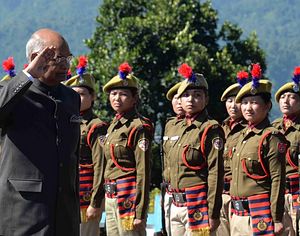Two months after China and India diffused tensions on the Doklam standoff, there seems to be a new risk looming over the two countries.
On November 19, Indian President Shri Ram Nath Kovind paid his first visit since assuming office in July to Arunachal Pradesh — a long-disputed territory between Beijing and New Delhi.
India categorizes Arunachal Pradesh as the northeastern-most state of the country, but the Chinese government has never recognized that claim. According to China, what India calls “Arunachal Pradesh” was established largely out of three areas belonging to China’s Tibet — Monyul, Loyul, and Lower Tsayul — which are “currently under India’s illegal occupation,” according to China’s state news agency Xinhua. China claims approximately 90,000 square kilometers of the state.
Meanwhile, the Indian government maintains that “Arunachal Pradesh is an integral and inalienable part of India.”
During the 1962 Sino-Indian War, Chinese troops temporarily captured part of Arunachal Pradesh, including Tawang, the birthplace of 6th Dalai Lama. Later, China declared a ceasefire and withdrew its troops to its claimed “line of actual control.” In 1987, India declared the founding of the state of Arunachal Pradesh.
Yet, both countries’ dispute over the territory has never stopped.
So far, China and India have held 19 rounds of talks on boundary issues; the latest round took place in April 2016. Through the talks, both sides agreed that “peace and tranquility on the border is the basis for the continued expansion of India-China relations.” The two countries also expressed that they were “committed to resolving bilateral issues through dialogue and peaceful negotiations and in a fair, reasonable and mutually acceptable manner.”
Unsurprisingly, China believes Kovind’s visit has broken that “peace and tranquility on the border” and immediately signaled strong opposition to India.
At the regular press briefing on November 20, China’s foreign ministry spokesperson Lu Kang mentioned that both countries are now trying to address the border issue “through dialogue and negotiation and seek a fair and reasonable solution acceptable to both sides.” So he urged India to “uphold peace and tranquility of the border area” until a solution is reached. He added:
China is firmly opposed to the activity of Indian leader in the disputed area. Now the China-India relations are at a crucial moment of development. We hope that the Indian side will work with us for the shared goal to uphold the larger picture of our bilateral relations, refrain from moves that may complicate the border issue, and create enabling conditions for the border talks and the sound and steady development of the relations between the two countries.
The “crucial moment” Lu referred to are the upcoming diplomatic events between Beijing and New Delhi. In early November, the Chinese foreign ministry revealed that the next round of Special Representative talks between India and China will be held in due course. And Chinese Foreign Minister Wang Yi is also planning to visit New Delhi in December for the Russia, India, and China foreign ministers meeting.
Under the circumstances, the timing of Kovind’s visit to Arunachal Pradesh looked considerably provocative from Beijing’s perspective. In particular, India’s Defense Minister Nirmala Sitharaman had just visited Arunachal Pradesh barely two weeks ago, again over Beijing’s opposition.
To make matters worse, Kovind’s address to the Arunachal Pradesh Legislative Assembly didn’t sound very friendly to China, either. In the speech, Kovind urged Arunachal Pradesh to trade and do business with neighboring countries, specifically with the “ASEAN countries under the Act East Policy,” without mentioning China at all.

































